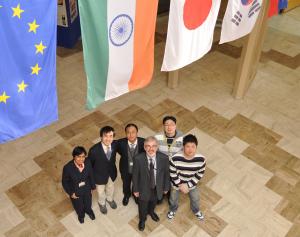Young talent and hard science
They've been with ITER for just one year and—judging by their presentations last Thursday—they've already done an impressive amount of work.
Introduced by their mentor David Campbell, coordinator of the Monaco Postdoctoral Fellowship Program, the five Monaco Fellows provided the gathered audience of supervisors, colleagues and friends with a broad perspective of their respective contributions to ITER.
Jing Na, from China, whose work is supervised by Luigi Serio and Ryuji Maekawa, presented his work on the ITER cryogenic system and the mathematical modelling schemes he devises to "to develop required process controls that guarantee the overall reliability, availability and safety of the refrigerator plant."
Debasmita Samaddar comes from India, with a detour through Fairbanks, Alaska, where she received her PhD for research in the temporal parallelization of computations of plasma turbulence. Her realm is also Mathematical simulation; she works under the supervision of Wayne Houlberg on the application of the parareal algorithm for temporal parallelization of plasma simulations.
To Sun Hee Kim, from Korea, CORSICA is not the large and sunny French island that lies some two hundred kilometres southeast of Marseille, but a free-boundary transport simulation code that is used to simulate ITER advanced operation scenarios. Before joining ITER, Sun Hee earned his PhD from the École Polytechnique de Lausanne, and spent one year as an EFDA postdoctoral researcher at the Magnetic Fusion Research Institute (IRFM) at nearby CEA. His supervisors at ITER are Joseph Snipes and Thomas Casper of the Plasma Operation Group.
Ian Pong, from the UK, has already acquired a strong experience in applied superconductivity both at Cambridge, where he earned his PhD, and at CERN where he spent two years as a postdoctoral fellow. At ITER, he works with Arnaud Devred in the Superconductor System and Auxiliaries Section. His presentation was about the current-sharing temperature of NbTi samples compared to prediction using NbTi strand single pinning mechanism parameterization.
Shimpei Futatani, from Japan, came to ITER as a neighbour: he was a researcher at the Université de Provence from 2007-2010, during which time he successfully completed two independent PhDs in the study of turbulent transport of impurities in fusion plasmas. Under the supervision of Alberto Loarte and Guido Huijsmans of the Plasma Confinement Group, he explores the implications for ITER of the modelling of ELM triggering in the US tokamak DIII-D.
Click here to read the abstracts of the Monaco Fellows' presentation last Thursday 19 January at René Gravier amphitheatre.


